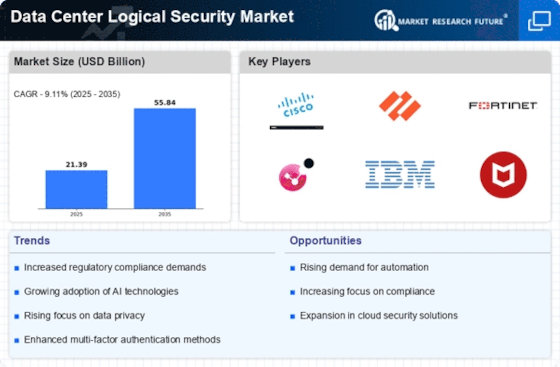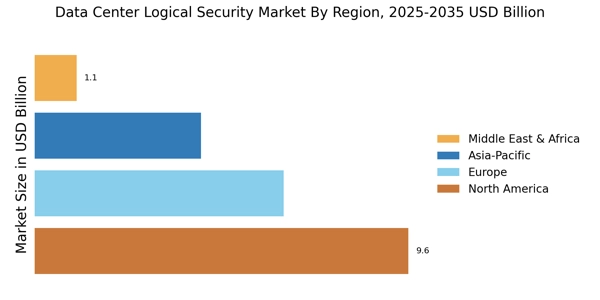Emergence of Remote Work
The Data Center Logical Security Market is being reshaped by the emergence of remote work, which has become increasingly prevalent. This shift has introduced new vulnerabilities, as employees access sensitive data from various locations and devices. Organizations are compelled to implement robust logical security measures to protect against unauthorized access and data breaches. The remote work trend is expected to persist, leading to a sustained demand for security solutions that can effectively manage and secure remote access. As a result, the Data Center Logical Security Market is likely to see continued growth as companies invest in technologies that facilitate secure remote operations and protect their digital assets.
Adoption of Cloud Services
The Data Center Logical Security Market is witnessing a notable shift towards the adoption of cloud services, which presents unique security challenges. As organizations migrate their operations to the cloud, they require advanced logical security solutions to protect their data in these environments. The cloud security market is expected to grow significantly, with estimates suggesting it could reach billions in revenue by the end of the decade. This transition necessitates a reevaluation of security strategies, as traditional methods may not suffice in cloud settings. Consequently, the Data Center Logical Security Market is likely to expand as businesses seek innovative solutions to secure their cloud infrastructures and ensure data integrity.
Increasing Cybersecurity Threats
The Data Center Logical Security Market is experiencing a surge in demand due to the increasing frequency and sophistication of cyber threats. Organizations are facing a myriad of challenges, including ransomware attacks, data breaches, and insider threats. According to recent statistics, the cost of cybercrime is projected to reach trillions of dollars annually, prompting businesses to invest heavily in logical security measures. This trend indicates a growing recognition of the need for robust security frameworks to protect sensitive data and maintain operational integrity. As a result, the Data Center Logical Security Market is likely to expand as companies seek advanced solutions to mitigate these risks and safeguard their digital assets.
Regulatory Compliance Requirements
The Data Center Logical Security Market is significantly influenced by the stringent regulatory compliance requirements imposed on organizations across various sectors. Regulations such as GDPR, HIPAA, and PCI DSS mandate that companies implement comprehensive security measures to protect sensitive information. Failure to comply can result in hefty fines and reputational damage, which drives organizations to prioritize logical security investments. The market is projected to grow as businesses strive to meet these compliance standards, leading to an increased demand for security solutions that ensure adherence to legal and regulatory frameworks. This trend underscores the critical role of logical security in maintaining compliance and protecting organizational integrity.
Integration of Advanced Technologies
The Data Center Logical Security Market is experiencing a transformation driven by the integration of advanced technologies such as artificial intelligence and machine learning. These technologies enhance the ability to detect and respond to security threats in real-time, thereby improving overall security posture. The market for AI-driven security solutions is projected to grow substantially, as organizations recognize the potential of these technologies to streamline security operations and reduce response times. This trend indicates a shift towards more proactive security measures, which are essential in the face of evolving cyber threats. Consequently, the Data Center Logical Security Market is likely to expand as businesses seek to leverage these advanced technologies to bolster their security frameworks.

















